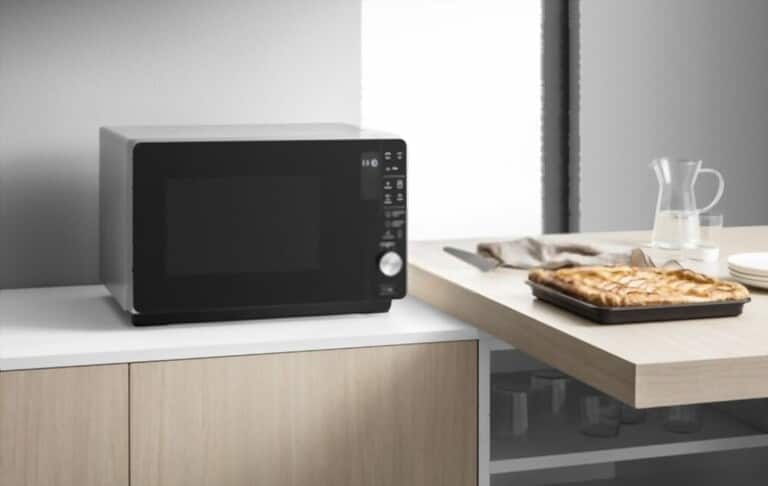The majority of people consider microwaves to be a necessary kitchen tool. But if you're one of the rare people who is still debating whether to use microwaves, then this article is specifically for you. Microwaves are easier to operate, don't burn food, are more cost-effective, and heat food more quickly and healthily than other ways. On the other hand, when cooking, you must use microwave-safe containers. In addition, microwaves have a limited ability and a propensity to overheat food, which could result in burns.
Learn more about the benefits of microwaves as they relate to cooking by reading this post. By the conclusion of this article, hopefully, you'll see that there are greater advantages than drawbacks and be inspired to get one as well.

What is a Microwave?
An equipment in the kitchen known as a microwave oven uses microwaves to excite the water molecules in food, which ultimately cooks the meal. This is one of the first modern kitchen appliances purchased. Since it was first created, this equipment has been a part of every home and completely changed the kitchen, helping people in a variety of ways. One of the great wonders of science and technological progress is the microwave, which helps to conserve time and energy that would otherwise be wasted in our kitchens and used for more productive uses. These only require pressing a few buttons on a panel, making them simple to use.
Mention how they function, saying that they enable you to reheat leftovers, remove pizza from the freezer an hour ahead eating it, or subsist on cereal all day. Mention the necessity for microwaves, which arises from the desire to cook meals fast and efficiently. Additionally, they are helpful since they feature sensors that, based on the number of seconds you set your timer for, can determine when your meal is done cooking.

Benefits Of Microwaves
You should read this article if you've heard rumors that microwaved food possibly causes skin cancer or that it depletes your favorite vegetables' nutrients. You really do. However, before discussing the disadvantages, here is a list of some obvious advantages of microwave ovens.
Microwaves' main selling points are their simplicity and convenience. While there are many additional advantages to utilizing a microwave oven, such as its compact design and accurate settings, the ease of cooking takes the prize. Here are a few more things you might be aware of if you have ever had a microwave.
Rapid heating or rewarming
The most important benefit of using a microwave is how quickly and easily leftovers or packaged food can be heated. A magnetron produces radio waves when a microwave oven cooks food, which then directly transfers heat energy into the food's molecules.
In the same way that the microwave oven's utensil rotates on the turntable, radio waves also pass through the food. The food and liquid can heat up quickly because its molecules vibrate really quickly.
Due to their lack of airborne pollutants, microwave ovens are additionally more green than traditional ovens. Conventional ovens' quick heating allows you to prepare food.

Programs for Precise Cooking
Most microwaves have preloaded cooking programs that let you select the food you want to prepare. Modern microwaves come packed with a ton of recipes that can be used to set timers.
To prepare soup in a microwave, all you must do is set a timer, go somewhere else, and wait. Once the microwave beeps, you can return and receive your soup. By heating it in the dish from which you would be eating the soup, you have also spared yourself some further washing. You won't need to stir the soup constantly while it cooks, as you would on a standard stove, to prevent it from burning just on the bottom.

Simple to Clean
The ease of cleaning the cooking cavity accompanying utensils is one of the microwave oven's most obvious benefits.
Food or liquid warms up and cooks quickly in a microwave. There may be a great deal of splatters when cooking dishes like soups. The most useful alternative is to clean immediately following each use. As you don't want your microwave to become clogged with food or drink that reheats constantly.
Cleaning your cooking cavity within the oven is quite easy because the interior is smooth and constructed of glass. You only need a moist towel to mop up any spills you detect.

Food Can Be Defrosted Using It
A microwave may be used to reheat frozen food, which is another noteworthy benefit of using one over an OTG oven. Food that is frozen is quickly melted and cooked while maintaining flavor.
Simply use the defrost option on your microwave to thaw the food while going about your daily activities. And instead of having to wait for the defrosted item to spend hours on the counter defrosting, you can immediately prepare it after finishing your tasks.

Children's Safety
For kids who are old enough, using a microwave instead of a stovetop or cooker is far safer. The microwave oven generates the least quantity of heat and smoke in the kitchen as compared to conventional ovens and gas burners.
Since microwave cooking does not generate extreme temps that could result in blisters or scalding, it is child-safe. For tiny toddlers, touch control panels on some microwave oven versions are ideal.

Different Heat Settings
These days, microwaves include a wide range of timer-setting options. Because microwaves have adjustable heat settings, you can decide how long you want to cook something for and how powerful you want the unit to be.
A microwave oven like this allows you to simply set the timer and walk away while your food cooks perfectly on its own. To enjoy a meal that is perfectly cooked, all you need to do is wait for the microwave to ding.
Using little energy
Cooking in the microwave also conserves money on your electricity bill. Microwave ovens can consume less energy than traditional ovens. The power of the microwave oven varies between 600 to 1200 watt. The microwave can be set up to turn off and on remotely. When the desired cooking temperature and time are reached, the oven shuts off.
No impact to nutrition or flavor
Meals prepared in a microwave is healthier than food prepared on a conventional stove. The food doesn't really burn and retains all of its flavors and nutrients thanks to the rapid cooking process. We can obtain food that has the same flavors or nutrition after microwaving it.
Cons of using a microwave
While microwaves provide a lot of benefits, I will confess that they also have a few downsides. To start with, you must be mindful and careful about the objects and materials you put in a microwave. A microwave-unsafe dish will cause a chemical process between the foods and the plastic, melting the dish and rendering the contents unusable.
Microwaves also have a capacity limitation, which makes them a poor choice for households with many members. And despite my wishful thinking, you cannot cook anything in a microwave. For example, it won't be possible to fry chips.
The last drawback of microwaves is that they can overheat foods, which results in soft, sloppy food and burned fingers and tongues (although this can also be a benefit if done correctly).
Conclusion
Overall, microwave cooking has been shown to be stress-free cooking, making many people's life simpler and less stressful without the requirement for a household where the kitchen takes up a lot of daily time.
However, the microwave may cause health problems if used frequently and without proper maintenance. The disadvantages of utilizing a microwave that was mentioned above are some that you should be aware of if you decide to add this small gadget to your kitchen armory. Yes, microwaves do have some drawbacks in addition to their many benefits. But if you compare them side by side, I'm very sure you'd want to upgrade your kitchen with a modern microwave.













